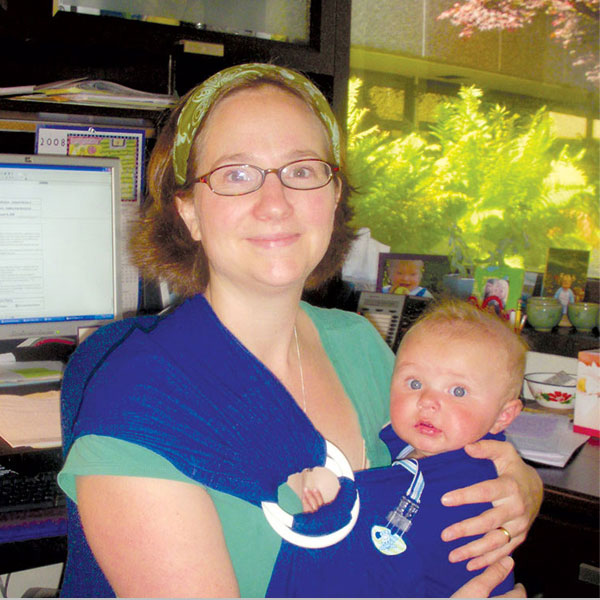I expected we’d face a few challenges during the course of our adoption, but I never imagined that negotiation with my employer would be one of them.
Like many babies adopted domestically, Mollie entered our lives rather abruptly. One winter morning, I answered my phone at work and heard those magic words, “You’ve been picked!” Mollie was born in a town about 200 miles away. Her birth mother had chosen us out of a stack of profiles shortly after the birth. By dinnertime, my husband, Steve, and I arrived at the hospital to meet Mollie’s birth mother and bring our new daughter home. It was a dream come true.
At the time Mollie was born, I had been employed full-time with a local government agency for about five months. My work was stimulating and challenging. I loved it. As soon as we returned home with Mollie, I e-mailed my supervisor to request three days leave without pay. Over those days, I thought, Steve and I would figure out how to balance our work responsibilities and caring for our newborn (our older daughter, then two, was happily established at a family day care). Steve, a schoolteacher, shared a classroom with another teacher, so he would stay home two days a week. We decided that I would ask to work from home three days a week or, if that wasn’t possible, to reduce my workload so that I could simply stay home those three days. That way, Steve or I could always be home with Mollie for the first months of her life. Or so we thought.
Stuck in red tape
Over the next two weeks, I met a bewildering array of barriers to what we’d assumed was a reasonable request. After days of back-and-forth negotiation and poring over policies and regulations, I found myself sitting in the human resources office, listening to an explanation of all the doors that were closed to me and why. I couldn’t take pregnancy leave because I hadn’t been pregnant. Short-term disability leave didn’t apply, because I wasn’t temporarily disabled by the event of giving birth. I was not eligible for the federal Family and Medical Leave Act (FMLA), because I hadn’t been with my employer for one year. I could not use the few vacation hours I had accumulated, because I hadn’t yet been employed for six months. I couldn’t use sick leave because I wasn’t sick. And, in one incredible moment, the HR staff member called the head of the department to ask if I could use three days of family sick leave to care for my newborn.
“Well, is the baby sick?” I could hear the voice on the other end of the line. “If so, the mom will need a doctor’s note. But if the baby is healthy, family sick leave isn’t an option for her.”
I was stunned. The HR staff members were nice people and personally sympathetic to my situation. Nonetheless, they were bound by policies that left no room for flexibility. “Adoption leave” didn’t fit any of the categories available to employees who had unusual and unexpected family needs.
I was exhausted from having been up all night with a newborn, and I broke down at this point. It seemed my only option was to resign from a job that I loved. “What am I supposed to do?” I wailed to the kind HR lady, as she handed me tissues. Perhaps naively, I had imagined that adoption would qualify for the same workplace protections and considerations as childbirth.
A happy medium
In the end, my employer and I reached a compromise. After the HR staffer sent a final memo to the top boss, the company agreed to temporarily reduce my position to four days a week. I was also given permission to bring Mollie to the office with me two of the four days. It wasn’t what I’d imagined during those three blissful days when Steve and I were both home with our newborn, but it was something I could live with.
In hindsight, I wish I had done my research and laid the groundwork for negotiating with my employer before Mollie arrived. With better preparation, I could have avoided the worry of those first weeks, and simply basked in the delight of my wonderful new daughter.



